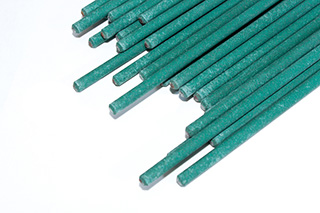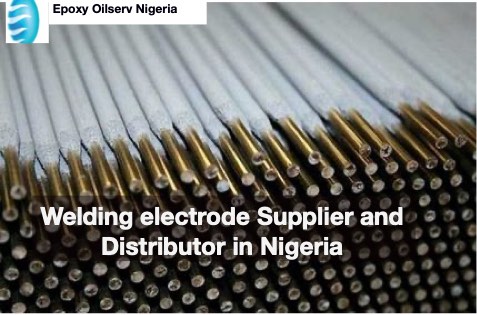Epoxy Oilserv Nigeria is the Largest supplier of welding electrodes in Nigeria, we are the major distributors of global brands such as Lincoln, Essab, Hobart and the best of international brands, we are also the major suppliers of locally produced electrodes in Nigeria.
If you are interested in a welding career, you might have already looked into the welding tools and equipment that are used. One of the most essential welding tools is the welding gun or welding machine which produces an electric current that melts and binds metal. Welding electrodes are essential, and it is important that a welder knows which type to use for different jobs.
What are welding electrodes or welding rods?

A welding electrode or welding rod is a coated metal wire. It is made of materials similar to the metal being welded. For starters, there are consumable and non-consumable electrodes. 1 In shield metal arc welding (SMAW) also known as a stick, electrodes are consumable, which means that the electrode is consumed during its use and melts with the weld. In Tungsten Inert Gas welding (TIG) electrodes are non-consumable, so they don’t melt and become part of the weld. With Gas Metal Arc Welding (GMAW) or MIG welding, electrodes are continuously fed wire. Flux-cored arc welding requires a continuously fed consumable tubular electrode containing a flux.
How to choose welding electrodes?
Choosing an electrode is determined by the requirements of the welding job. These include:
- Tensile strength
- Ductility
- Corrosion resistance
- Base metal
- Weld position
- Polarity
- Current
There are light and heavy coated electrodes. Light coated electrodes have a light coating that is applied through brushing, spraying, dipping, washing, wiping, or tumbling. Heavy coated electrodes are coated by extrusion or dripping. There are three main kinds of heavy coatings: mineral, cellulose, or a combination of the two. Heavy coatings are used for welding cast iron, steels, and hard surfaces.
The 4 Major Types of Welding Electrode coatings
In the welding industry, the following 4 major types of welding electrode coatings are the most commonly used. They are
- Rutile Coating
- Basic or low H2 Coating
- Cellulosic Coating
- Iron oxide Coating
Rutile electrode
The rutile type electrodes present the best properties in use: a very good arc stability, transfer of metal in fine drops which generally results in a low level of spatters and lower fume emission than the basic electrodes, a very good bead wetting and a very easy restart from cold.
However, by its nature, this slag has an influence on the content of residual elements in the deposited metal. The elements which are in general not desirable from the perspective of optimizing mechanical properties. They are
Oxygen:
The oxygen content of the deposited metal can vary according to nature and the quantity of the deoxidizing elements present in the coating. The oxygen content cannot be lowered to the level which can be reached with a basic electrode. This results is a most significant inclusion content and consequently in a lower ductile fracture energy during impact tests.
Titanium:
The titanium content of the deposited metal cannot be adjusted, as we would wish, in order to optimize the mechanical properties. Indeed, the slag being mainly composed of rutile elements (titanium oxide TiO2), some titanium is inevitably transferred to the deposited metal in variable quantities. According to the oxidoreduction reactions and the metal-slag exchanges which occur in the arc and the interface with the weld pool. These reactions depend on all the chemical elements present, which must be balanced according to the various mechanical characteristics that the weld must meet (tensile strength, yield strength) and depend on the type of steel that we have to weld.
Niobium and Vanadium:
The niobium and vanadium content of the deposited metal cannot be lowered beyond a certain point. Because these elements exist as impurities in the natural rutiles used in the manufacture of welding products. The use of synthetic rutiles, which are therefore very pure, is possible but not common. Because its cost is significantly higher than that of the natural rutiles.
Diffusible Hydrogen:
The diffusible hydrogen content of welds created with rutile electrodes is always very high. Usually, this results from the presence of organic materials added to facilitate extrusion and to improve the arc’s characteristics. However, it is also a result of low baking temperatures which makes it possible to eliminate only a small proportion of the water incorporated with the silicate and it does not break up the extrusion agents.
Thus, rutile electrodes are valued for their user-friendliness and the creation of a weld bead, whereas basic electrodes are essential when the joints to be made must satisfy severe metallurgical quality standards.
Basic or low hydrogen Electrode Coating
The basic electrode coating is made up of calcium carbonates and fluorite. This coated electrodes must satisfy the required mechanical properties of the steels which it is intended to weld (tensile, impact strength, CTOD, creep, etc.). Many analytical combinations make it possible to obtain the tensile characteristics sought in the deposited metal, but the solutions that satisfy both the tensile and toughness characteristics are much more limited. This is increasingly true the higher the tensile properties.
In addition, the chemical balance retained for an electrode must be the most robust possible, i.e. it must satisfy the various requirements in spite of the variations inherent in any industrial production, and that, in a broad field of welding conditions (thermal cycles). Lastly, a basic electrode must be designed so that the diffusible hydrogen content in the deposited metal is as low as possible in order to avoid any risk of cold cracking while minimizing or even precluding pre-heating and post-heating.
Cellulosic Electrode coating
The cellulosic electrode coating is made up of organic materials mostly cellulose. Cellulosic electrode coating is identical as rutile. But, the basic difference is the percentage of Titanium dioxide,(Tio2 ) is less in the cellulosic coating. When cellulosic burns, it results is the evolution of a mixture of hydrogen and carbon monoxide. These gases provide a protective shield to the molten base metal.
When compare with the same thickness of the work a cellulosic coating results in deeper penetration as compared to rutile coating. Since the rate of evolution of hydrogen gas is high there is a danger of hydrogen embrittlement of the base metal.
Iron oxide electrode coating
The electrode coated with iron oxide improves arc behavior, bead appearance; helps increase the metal deposition rate and arc travel speed. During welding evolution of hydrogen gas is less as compared with the cellulosic coated electrode. Also it as low penetration and good look weld penetration.
You can purchase our products from our partner online shops here GZ Industrial supplies and Tikweld welding supplies
Frequently asked questions
The American Welding Society (AWS) has a numbering system that offers information about a specific electrode, such as what application it is best used for and how it should be operated for maximum efficacy.
The “E” indicates an arc welding electrode. The first two digits of a 4-digit number and the first three digits of a 5-digit number stand for tensile strength. For example, E6010 means 60,000 pounds per square inch (PSI) tensile strength and E10018 means 100,000 psi tensile strength. The next to last digit indicates position. So, “1” stands for an all position electrode, “2” for a flat and horizontal electrode, and “4” for a flat, horizontal, vertical down and overhead electrode. The last two digits specify the type of coating and the welding current.
E60110Electrode
Tensile Strength
Position
Type of Coating & Current
As a professional welder, you must know the different types of electrodes and their applications in order to perform the welding job correctly. Considerations include welding method, welded materials, indoor/outdoor conditions, and welding positions. Practicing with various welding guns and electrodes can help you determine which electrode to use for what welding project.
A welding electrode is made up of two parts: the actual metal, and the flux coating. The metal can vary from mild-steel, cast iron, stainless steel, high-tensile steel, copper, bronze, brass, or aluminium.
The first two digits of a 4-digit number and the first three digits of a 5-digit number stand for tensile strength. … The next to last digit indicates position. So, “1” stands for an all position electrode, “2” for a flat and horizontal electrode, and “4” for a flat, horizontal, vertical down and overhead electrode.
What are the most common stick electrodes? Hundreds, if not thousands, of stick electrodes exist, but the most popular are mild steel electrodes, which fall into the American Welding Society (AWS) classification A5. 1. These include the 6010, 6011, 6012, 6013, 7014, 7024 and 7018 electrodes.
25 years
How long will they last in storage,,,anywhere from a week to 25 years,,depending on who does the storing and how they do it,,,,there are no BBF dates on welding rods,,,paper rods like 6010,, 6011,, should be stored at room temp for many years and still work fine,,other rods need warmer temps if the package is opened .
You will typically see E7018 on a Welding Rod
The “E” in E7018 electrode indicates a tool used for an arc-welding process. The 70 means it makes welds that are very strong (70,000 psi). The 18 means two things: The “1” means the electrode can be used in any position, and the “18” means low hydrogen and usually DC current.
Submit your review | |
